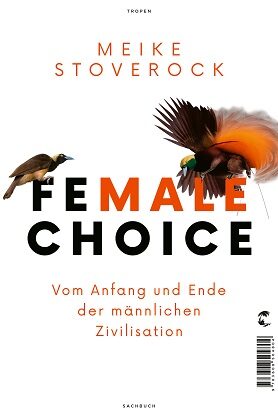Meike Stoverock
Female Choice. Vom Anfang und Ende der männlichen Zivilisation
[Female Choice. About the Beginning and End of Male Civilization]
- Tropen Verlag
- Stuttgart 2021
- ISBN 978-3-608-50480-4
- 352 Pages
- Publisher’s contact details
Translation Grant Programme
Published in Italian with a grant from Litrix.de.
Published in Italian with a grant from Litrix.de.
Sample translations
Learning from Nature. How Women Can Find Their Own King Penguin
“Starting a sentence with the words ‘men/women are’ is a bit like juggling two burning swords while riding a unicycle across a tightrope while blindfolded and without a safety net because the idiot circus director has taken it to the dry cleaners.” What an overture! Especially for a work of non-fiction in which the author warns in her introduction: “This book almost entirely consists of trigger words, regardless of what gender and political camp you belong to.” Female Choice by biologist and blogger Meike Stoverock is indeed a book with a universal thesis: that since the beginning of civilization, the world has been ordered according to androcentric (andrós being the Greek word for man) standards and needs. This male bias is so deeply rooted in our cultural soil that we today can no longer uncover it without causing society itself to crash to the ground.
Structuring the world along male concepts of ownership, status and performance has become second nature, as has running the economy according to the logical of hierarchization. Leaving that aside, however, how many women are aware that the average weight of a crash-test dummy and the standard height of a closet conform to male body? Women are left to cope with these norms as best they can, if need be by climbing up on a stool. “Our civilization arose because one sort of human beings had to solve its problems,” writes Stoverock. “One sort. Its problems. Our civilization is male. That doesn’t automatically make it bad, but we finally have to realize how one-sided and monochrome it is.”
Readers can decide how seriously they want to take this problem. But regardless, in many areas of society, it has recently become clear that we’re on the verge of epochal change: “In the past few years, progressive positions, globally and locally, have tended to be taken up by women, while men are overrepresented within conservative, reactionary positions. Greta Thunberg is the personification of Fridays for Future, #MeToo began with stories told by women, and so-called intersectional feminism no longer treat women as a homogeneous group but recognize minorities that have for too long been excluded from mainstream discourses. Men make up the majority of those who support coal-mining and combustion engines and who oppose feminism, vegetarianism and accepting refugees. The rise of the right-wing populism – as evidenced in the electoral successes of Donald Trump, Jair Bolsonaro or the radical AfD party in Germany – is primarily the work of men.
What’s the alternative? How can we resist the androcentric battle for global power at the cost of the environment, social solidarity and world peace? Stoverock has an idea that stands out in contemporary feminist discourse as both original and powerful. The “female choice” from which her book takes its title is an evolutionary, biological principle that can be observed in the animal kingdom. In a nutshell, it states that the male members of an animal population must go to great lengths to win over the female members as mates.
In nature, a female is often wooed by a large number of males displaying their plumage, issuing mating calls and spreading their scents. Female shop around for the highest quality for their offspring. Males are always ready to mate because nature has genetically programmed them to distribute their seed as broadly as possible to ensure the survival of their line. Darwin called this principle “sexual selection,” and it’s controlled by females who regulate male access to sex. From an evolutionary, biological perspective, this is an extremely sensible and successful principle, one that also applied to our own species before humankind became sedentary. But male members of the species weren’t at all pleased since, as Stoverock writes, “one of the major characteristics of female choice is that the majority of men find very few mates or none at all.”
In rapid, giant steps, Stoverock recounts the history of human civilization, beginning with the end of nomadism, as a history of managing male sexual frustration. How was this achieved? By domesticizing women, relegating them to the household and making them dependent on male economies. Stoverock proposes: “In order to permanently improve the numerical disadvantages entailed within female choice, women had to be brought to have regular sex with and bear children from the less attractive, non-premium males – and also to stay with them beyond the natural breaking-apart point of three to four years.”
So far, so good. But Stoverock goes well beyond just describing the way our civilization is culturally constructed according to hierarchies. She also points readers concisely and provocatively in the direction of a new era of human coexistence, a return to the female choice principle in reproduction and control over the resource of sex. This is the only way, Stoverock argues, that the emancipation of women that begun with the invention of the birth-control pill can continue.
Meike Stoverock’s book is a fast-paced ride through the history of the suppression of female sexuality. It is polemic and utopian, raising more questions than easy, practical answers. Nonetheless, the constant flow of cheerily presented ideas is as refreshing as an ocean breeze. Readers immediately feel the desire to embark a new future, together with all the men and women of this planet, according to the female choice principle: “No one sex dominates the other.”

Structuring the world along male concepts of ownership, status and performance has become second nature, as has running the economy according to the logical of hierarchization. Leaving that aside, however, how many women are aware that the average weight of a crash-test dummy and the standard height of a closet conform to male body? Women are left to cope with these norms as best they can, if need be by climbing up on a stool. “Our civilization arose because one sort of human beings had to solve its problems,” writes Stoverock. “One sort. Its problems. Our civilization is male. That doesn’t automatically make it bad, but we finally have to realize how one-sided and monochrome it is.”
Readers can decide how seriously they want to take this problem. But regardless, in many areas of society, it has recently become clear that we’re on the verge of epochal change: “In the past few years, progressive positions, globally and locally, have tended to be taken up by women, while men are overrepresented within conservative, reactionary positions. Greta Thunberg is the personification of Fridays for Future, #MeToo began with stories told by women, and so-called intersectional feminism no longer treat women as a homogeneous group but recognize minorities that have for too long been excluded from mainstream discourses. Men make up the majority of those who support coal-mining and combustion engines and who oppose feminism, vegetarianism and accepting refugees. The rise of the right-wing populism – as evidenced in the electoral successes of Donald Trump, Jair Bolsonaro or the radical AfD party in Germany – is primarily the work of men.
What’s the alternative? How can we resist the androcentric battle for global power at the cost of the environment, social solidarity and world peace? Stoverock has an idea that stands out in contemporary feminist discourse as both original and powerful. The “female choice” from which her book takes its title is an evolutionary, biological principle that can be observed in the animal kingdom. In a nutshell, it states that the male members of an animal population must go to great lengths to win over the female members as mates.
In nature, a female is often wooed by a large number of males displaying their plumage, issuing mating calls and spreading their scents. Female shop around for the highest quality for their offspring. Males are always ready to mate because nature has genetically programmed them to distribute their seed as broadly as possible to ensure the survival of their line. Darwin called this principle “sexual selection,” and it’s controlled by females who regulate male access to sex. From an evolutionary, biological perspective, this is an extremely sensible and successful principle, one that also applied to our own species before humankind became sedentary. But male members of the species weren’t at all pleased since, as Stoverock writes, “one of the major characteristics of female choice is that the majority of men find very few mates or none at all.”
In rapid, giant steps, Stoverock recounts the history of human civilization, beginning with the end of nomadism, as a history of managing male sexual frustration. How was this achieved? By domesticizing women, relegating them to the household and making them dependent on male economies. Stoverock proposes: “In order to permanently improve the numerical disadvantages entailed within female choice, women had to be brought to have regular sex with and bear children from the less attractive, non-premium males – and also to stay with them beyond the natural breaking-apart point of three to four years.”
So far, so good. But Stoverock goes well beyond just describing the way our civilization is culturally constructed according to hierarchies. She also points readers concisely and provocatively in the direction of a new era of human coexistence, a return to the female choice principle in reproduction and control over the resource of sex. This is the only way, Stoverock argues, that the emancipation of women that begun with the invention of the birth-control pill can continue.
Meike Stoverock’s book is a fast-paced ride through the history of the suppression of female sexuality. It is polemic and utopian, raising more questions than easy, practical answers. Nonetheless, the constant flow of cheerily presented ideas is as refreshing as an ocean breeze. Readers immediately feel the desire to embark a new future, together with all the men and women of this planet, according to the female choice principle: “No one sex dominates the other.”
Translated by Jefferson Chase

By Katharina Teutsch
Katharina Teutsch is a journalist and critic. She writes for newspapers and magazines such as: the Frankfurter Allgemeine Zeitung, Tagesspiegel, die Zeit, PhilosophieMagazin and for Deutschlandradio Kultur.
Publisher's Summary
How men tricked evolution, took power over women and why this stops now. This is Big Picture Feminism! Biology meets cultural history in this mustread book for anyone who would like to understand and participate in the gender debate and discussions about the origins of our civilization.
(Text: Tropen Verlag)
